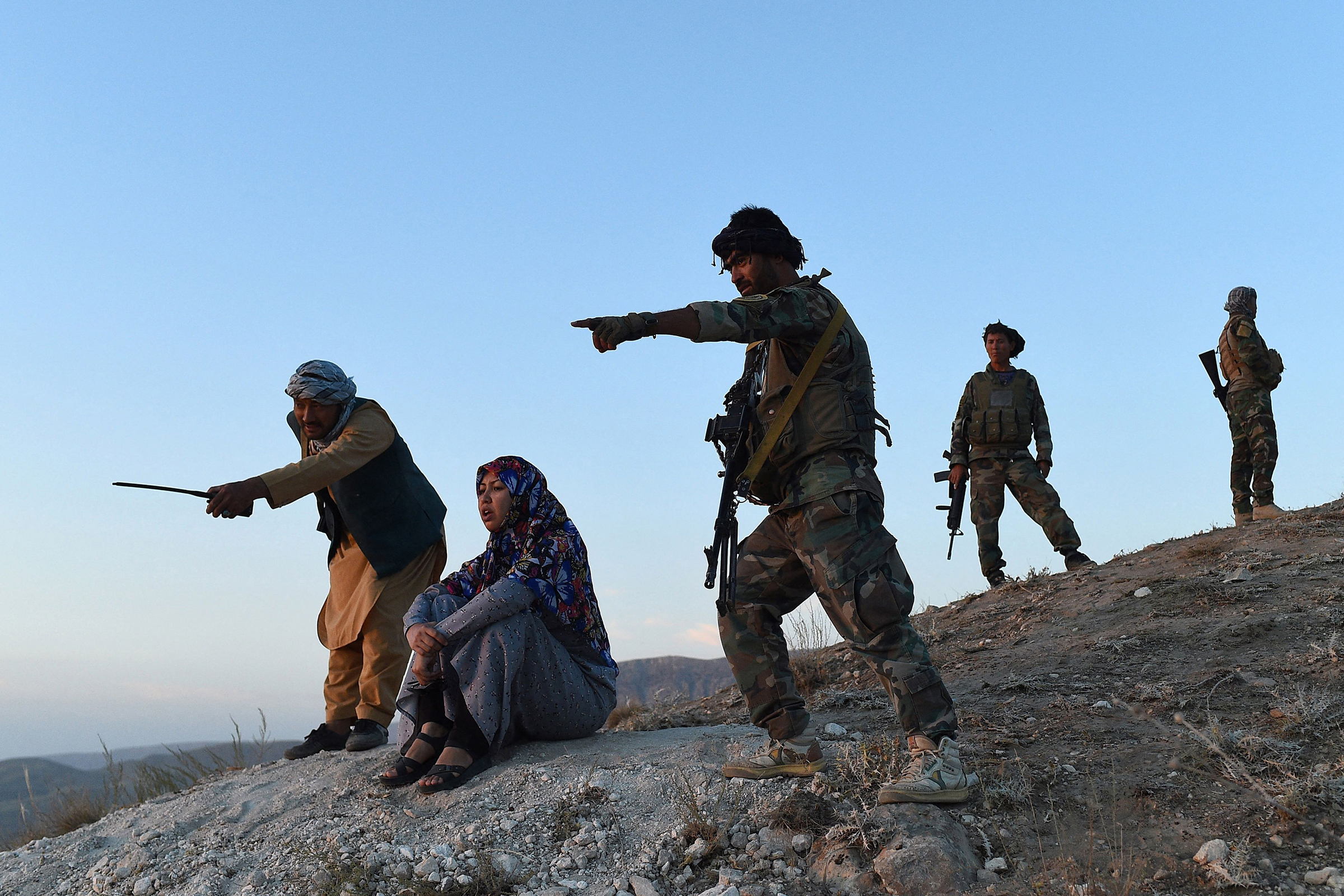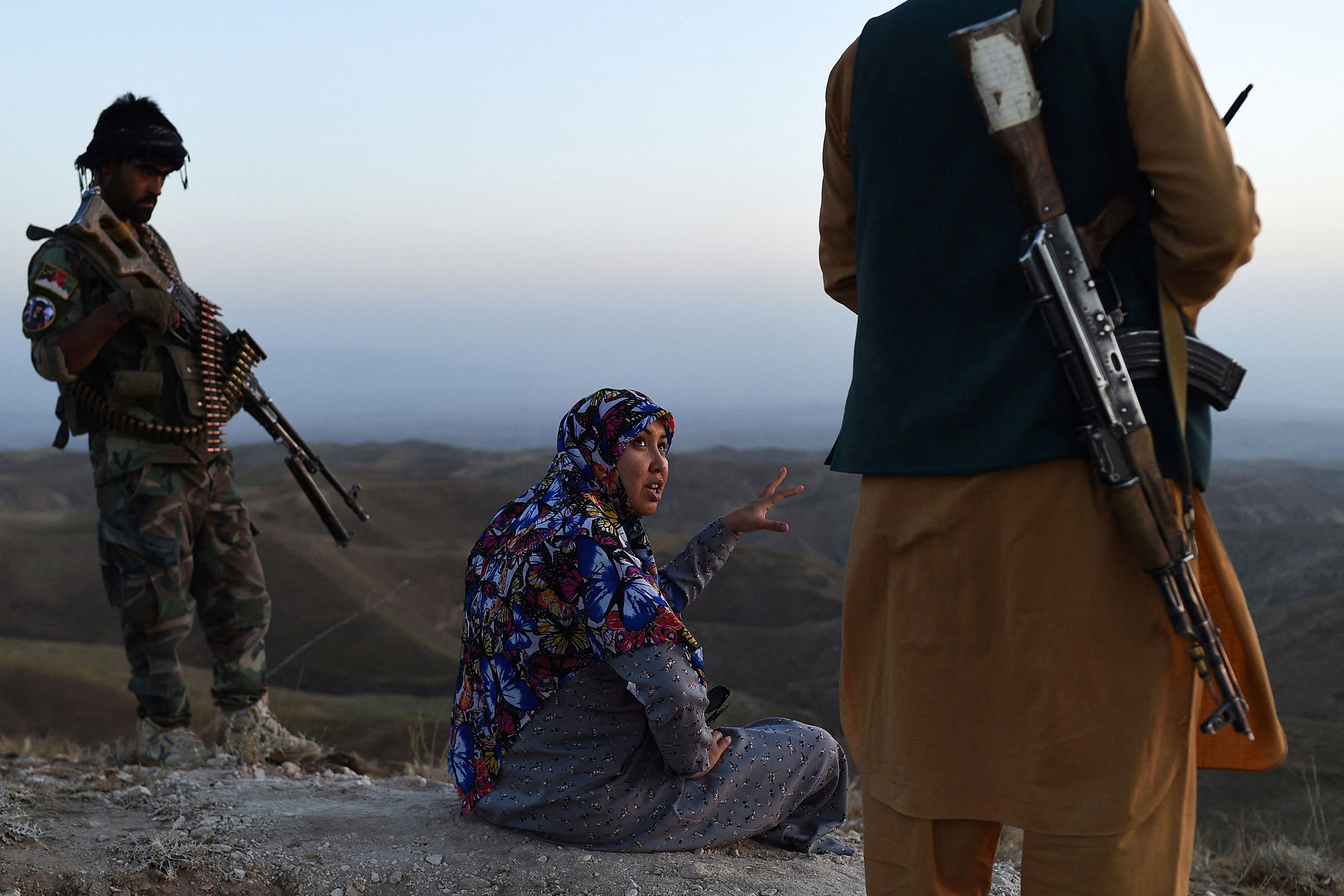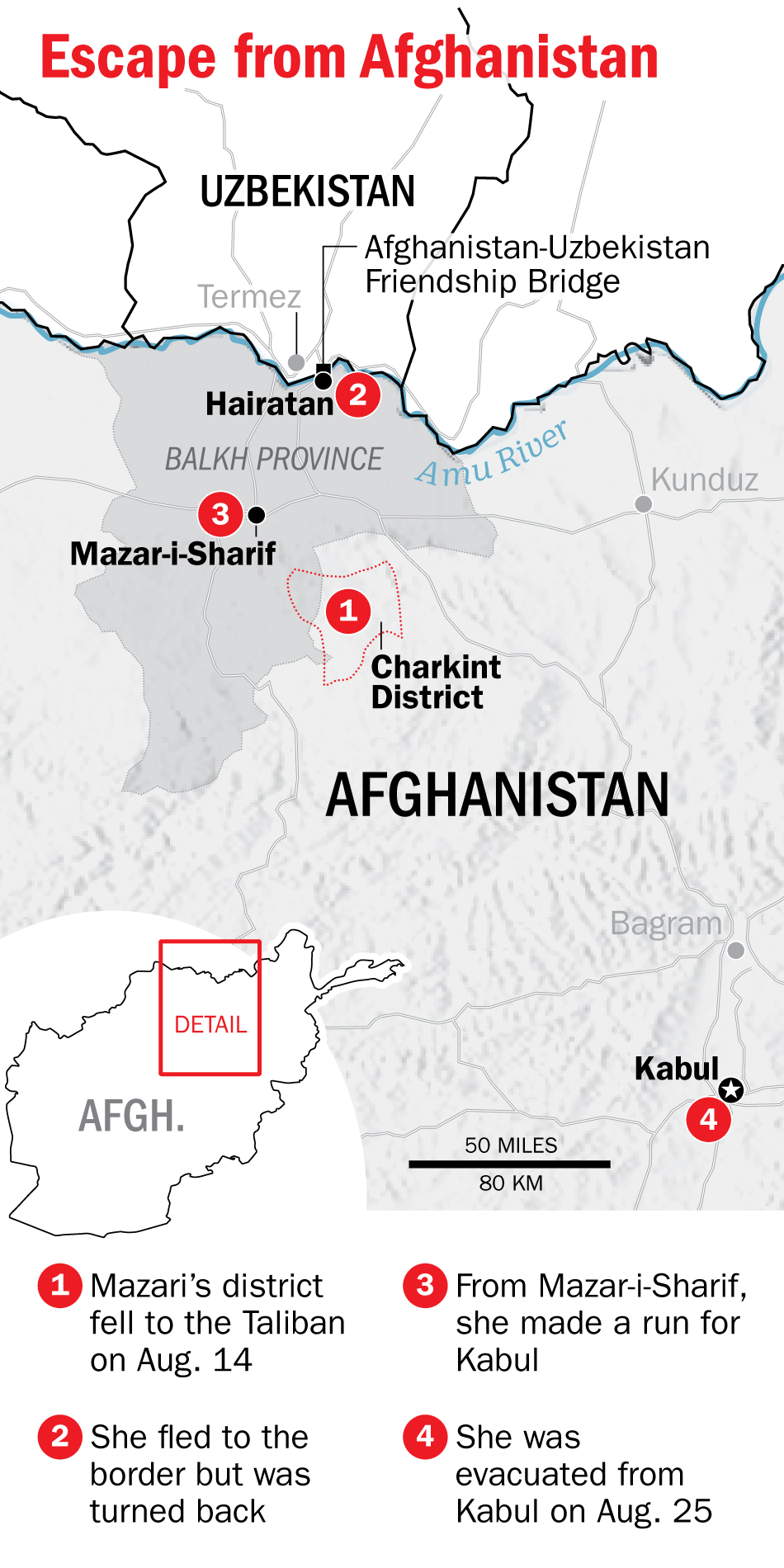
For the past few weeks, the world has believed Salima Mazari to be a prisoner of the Taliban—and possibly dead.
One of only three female district governors in Afghanistan, and the leader of a pro-government militia, the 39-year-old had an international reputation as a fearless fighter. The Guardian profiled her at length. She was interviewed by the Associated Press, Agence France-Presse and other international news outlets, fascinated by her courage in the defense of her district, Charkint, which lies about 230 miles north of Kabul.
Mazari had survived several ambushes and believed herself to be on a Taliban hit list. When the provincial capital, Mazar-i-Sharif, fell to the Taliban in mid-August, she went missing in the commotion and didn’t surface in the days following. The fighting in Charkint had been fierce.
“Before the collapse of Kabul and Mazar-i-Sharif, the Taliban attacked Charkint district more than 30 times from different directions,” she tells TIME.
Several media outlets, including People magazine and Insider, reported Mazari as possibly captured. On Twitter, supporters worldwide adopted the hashtag #FreeSalima in a campaign demanding her release. Some began to wonder if she was even alive. As stories began to filter in of the Taliban settling old scores—killing a pregnant police officer, and shooting senior security officials—many assumed the worst.
But we can report that Mazari is alive. She was never captured. After a harrowing escape from Afghanistan, she is now at an undisclosed location in the United States.
We know this because one of the authors of this piece was involved in her escape.
We are two journalists—Zakarya is an Afghan and Robyn a Canadian—who have reported from the strife-torn country in the past. Zakarya was based in Afghanistan but able to leave for Paris during the evacuation. He kept in touch with Mazari after the Taliban seized power and she went into hiding. Together in a joint rescue effort by Afghans, Americans and Canadians, he helped to play a part in getting her to safety.
This is what happened.
The fall of Mazar-i-Sharif
With a population of around 32,000, Charkint is a mountainous area of small hilltop villages and grazing lands in Balkh province, near the border with Uzbekistan. When she became governor in 2018, Mazari was determined to bring better outcomes for her community, but the job was never easy.
In her early days in office, she organized the recruitment and training of local militia and government forces to fight against the Taliban. When conflict broke out, she picked up a gun and joined her men on the front line, earning respect as a staunch, outspoken commander. In 2020, she fearlessly negotiated the surrender of over 100 Taliban insurgents.
As the Taliban campaign intensified over the summer, Mazari and her militia held out—inflicting, she says, “large numbers of casualties” on the enemy. But when Mazar-i-Sharif—Afghanistan’s fourth largest city—fell on Aug. 14, and the Afghan National Army surrendered Balkh to the Taliban, pro-government fighters were forced to face the inevitable.
For Mazari, the capitulation marked both a devastating end to life as she knew it, and the unwelcome start of a new one.
She belongs to the Hazara, an ethnic minority persecuted for its Shia faith and Eurasian ancestry by Afghanistan’s majority Sunni population. The last time the Taliban seized Mazar-i-Sharif, in 1998, the insurgents massacred some 2,000 Hazara, mostly men and boys.
It seemed that nothing much had changed in the intervening years. Amnesty International reported that the Taliban tortured and killed nine Hazara men in Ghazni province, about 90 miles southwest of Kabul, in July. It was also reported that they had shot 14 Hazara—12 surrendered soldiers and 2 civilians—in Daykundi province at the end of August.
Mazari believed that death or escape were her only choices.

On the run from the Taliban
When the news of Balkh’s surrender broke, Mazari was in the office of Mohammad Farhad Azimi, the provincial governor. His guards ran into the office shouting that government forces had surrendered, and the Taliban were entering Mazar-i-Sharif from all directions. She recalls feeling suffocated as the reality of defeat started to sink in. There were frantic phone calls from militia leaders in Charkint, about 45 miles to the south, telling her that the roads to her district were blocked and the Taliban were planning to ambush anyone who passed through. Mazari commended her men and told them to stand down.
“Continuing to fight would be against the interests of our people,” she says.
Azimi suggested finding a way to the border with Uzbekistan and the town of Hairatan, a 75-minute drive from Mazar-i-Sharif. From there, the Afghanistan-Uzbekistan Friendship Bridge, spanning the Amu River, could take them to safety.
“We set off in a convoy together with my husband and guards. Several high-profile leaders, including former vice-president and warlord, Abdul Rashid Dostum, and former Balkh governor and mujahideen commander Atta Mohammad Noor, joined us on the way. Many Afghan military units also followed the exodus,” Mazari says.
By the time they arrived at Hairatan, the Afghan side of the bridge was crowded with top officials. Everyone was in a panic. To her despair, Mazari was not allowed to make the crossing. Only Azimi, Dostum, Noor and some legislators were permitted into Uzbekistan. Mazari and many others were pushed back and left on the banks of the Amu, pleading in vain.
Read more: These Women Fought for Afghanistan’s Future. Now They Don’t Want to Leave It Behind
Knowing the Taliban would soon arrive in Hairatan, too, Mazari says she briefly sought refuge at a relative’s house in the town. Then she donned a burqa—known as a chadari in Afghanistan—and made a swift dash by car to a quiet highway junction in the desert. There, other relatives were waiting to smuggle her back to Mazar-i-Sharif.
“We hid for two days in relatives’ houses in the city, then decided to make a run for Kabul,” she says. There was no knowing what would happen on the road, but reaching the Afghan capital’s airport, and boarding an evacuation flight, was her only hope. Mazari says she had heard from others crossing the country that the Taliban was less likely to question larger groups of civilians at checkpoints, especially if there were many chadari-clad women present. She slipped the garment on again, and together with her husband and several relatives set off in a battered old vehicle.
They clutched each other’s hands nervously as they approached each checkpoint. But luck was on their side. “Fortunately, we were not recognized by any Taliban fighters,” Mazari tells TIME. “They let us through easily. It was the first day of the collapse of the country, and they were celebrating.”
They made it to Kabul, where they would begin the “saddening” process of continually moving from safe house to safe house to ensure they could not be tracked. Mazari was unsure what to do next and who to trust. She knew she was too high profile to make an open dash for an embassy or the airport, so she sent her documents to friends who had connections to foreign governments, including those of the U.S., U.K., Germany, and the Netherlands.

Organizing Mazari’s rescue
One of the people Mazari sent her documents to was Zakarya.
On Aug. 20, Zakarya, who had been had been airlifted to Paris earlier that week, sent a text message to Mazari, looking to confirm whether or not she was alive. We had been working on a story together about Afghan women, including Mazari, and Zakarya had given his number to her when he interviewed the governor in July. “I’m worried—please let me know where you are,” he wrote.
Fearing traps, Mazari had not been responding to messages from unfamiliar numbers, but she recognized Zakarya’s. She told him that she was in hiding and, with few options remaining, sent him the identity information of all her family members and asked for help.
Zakarya immediately relayed the news to Robyn: “I just heard from Salima Mazari. She is in Kabul.”
Robyn’s partner, the Canadian photojournalist Matt Reichel, had already been working on helping colleagues and friends get out of Afghanistan. Reichel was in contact with everyone he knew who could possibly help and was aware of a few U.S. officials who might look at Mazari’s case. He fired off several pleas to contacts in the State Department and Department of Defense, hoping one would work.
“We prepared all her documents with a cover letter explaining Salima Mazari is alive, incredibly high risk, and will likely be murdered if she is found. She has no idea what to do and is hiding in a safe house,” he says.
“Eventually, one of my friends at the State Department, who wishes to remain unnamed, but has been instrumental in helping countless vulnerable Afghans escape, was able to forward her information to the Joint Interagency Task Force (JIATF) and a high-level figure in the Secretary of State’s office. This individual replied within hours offering help.”
Salima’s information had already been provided to JIATF through another connection, Khadim Dai, a Hazara filmmaker in Los Angeles who had been running a parallel operation through his own State department contact. Her name pinged across many channels and was gaining momentum and support. Reichel’s contact helped to escalate the request for an emergency evacuation.
Dai’s friend in London, the British Hazara activist Homira Rezai, also shared news of Mazari’s status and asked him for help. “I didn’t know her personally, but knew of her story and wanted to help her. She’s a woman who is fighting, trying so hard to change things, and can be a role model for our generation of Hazaras growing up in the West,” explains Dai.
The day before the rescue, his own contact at the State Department told him “something will happen soon.”
Escape from Kabul
Mazari was afraid that the Taliban would close in on her location in a matter of days, but she followed Zakarya’s advice and waited. He was checking in on her frequently to make sure she was safe and to offer hope and reassurance—but Mazari’s extraction wouldn’t take place without a last-minute scare.
On Aug. 24, just after dawn, Mazari received Signal messages in English, sent via an unknown Afghan number, claiming to be from an American rescue coordination cell. In a lapse of anxious excitement, she says she shared all her family information and the precise coordinates of her overnight location. She followed instructions after the sender told her to attach a picture of herself making the peace sign. But when she told Zakarya what had happened, he became alarmed because, after a brief English introduction, the rescue instructions were supposed to be in Dari—an Afghan dialect of the Persian language. He and Mazari suspected that Pakistani agents were running interference.
“I knew that Pakistan had been cooperating with the Taliban, and that some of the group’s most famous leadership councils are based in Pakistan. I worried that it could be the Taliban or ISI [Pakistani intelligence] accessing our chat,” Zakarya says.
“We were scrambling to figure out if we could confirm the identity of this person,” says Reichel. “We have an Afghan phone number, and don’t know if this is a legitimate operation or a trap. My friend at State told me to immediately instruct Salima to change her hijab, and prepare to possibly change locations while we figured out what to do next.”
Read more: What the U.S. Owes to Afghanistan’s People Has No Expiry Date
Reichel decided to call the number on Signal. No one picked up, but Robyn noticed the user also had a WhatsApp account, and that the app was showing them as being online. Reichel dialed again on WhatsApp. This time, the call was answered. It was a U.S. Army major. Several Americans could be heard talking energetically in the background.
“Naturally, he was confused as to why a random number from Canada was calling him,” says Reichel. “He asked who I was. I introduced myself as a journalist and Salima’s point of contact. I told him his number reached out to Salima, she gave away all her identifying information and location, and we were concerned.”
Luckily, the State Department was quickly able to confirm the Army officer’s identity. “I got a call back from my friend at State saying, ‘It’s confirmed. This is a real operation, make sure she is on time at the rescue point and knows how to get there.'”
The plan was to extract Mazari and her family by helicopter, and then chopper them into Hamid Karzai International Airport. At 7:00 p.m. that evening, Mazari received a call telling her to meet at the rendezvous point.
She remembers scrambling to figure out the location (fortunately she had been well versed in map reading as a military commander) and then hastily setting out on foot with all 13 of her family members, a number of them children. Zakarya was waiting in tense anticipation for news. She messaged him at 7:22 pm minutes later to say that she was at Kabul airport.
The next day, Mazari and her family boarded a U.S. military flight to Qatar, and they are now at an undisclosed location in the U.S. awaiting resettlement.
She had made it.
Salima Mazari’s fight ‘will never end’
Leaving Afghanistan saved Mazari from almost certain death, but it is also, in a way, her worst nightmare. She never wanted to leave a country she fought so hard to defend—and she feels betrayed by her government.
“At Kabul airport, I witnessed the fall of a nation,” she says. “I saw families fleeing and leaving everything behind … It was difficult to see my people in that situation. Everyone I spoke to is dealing with the weight of sadness on their shoulders.”
She continues: “I have cried a lot. I have thought about all those youth who were sacrificed in the past 20 years for the evils of politics. I thought about the aspirations of a generation that are heading towards destruction. I feel a lump in my throat when thinking of my people and fellow soldiers’ struggles, sacrifices and deaths. Every time I think of these things, I feel like I am dying.”
Today, the outlook for women in Afghanistan is particularly bleak. While a Taliban spokesperson has communicated that women can continue to work in government, they are not permitted to hold cabinet or other senior positions.
The Taliban recently announced the formation of their new government, and there were no women or Hazaras included. Women continue to be turned away from their jobs across the country. And the Taliban’s opponents are scattered and in shock.
“At the moment, armed fighting is no longer the solution—we need to figure out a different way to help the country,” Mazari concedes. But she remains no less determined to help. “My fight for the freedom and pride of my people will never end.”
—With reporting by Leslie Dickstein and Nik Popli
More Must-Reads from TIME
- Why Biden Dropped Out
- Ukraine’s Plan to Survive Trump
- The Rise of a New Kind of Parenting Guru
- The Chaos and Commotion of the RNC in Photos
- Why We All Have a Stake in Twisters’ Success
- 8 Eating Habits That Actually Improve Your Sleep
- Welcome to the Noah Lyles Olympics
- Get Our Paris Olympics Newsletter in Your Inbox
Contact us at letters@time.com